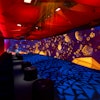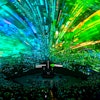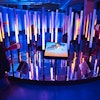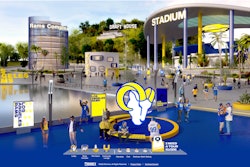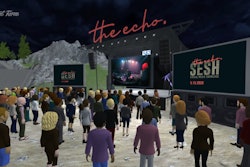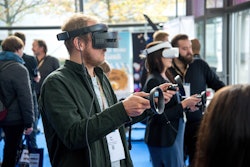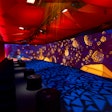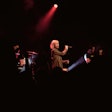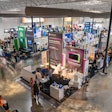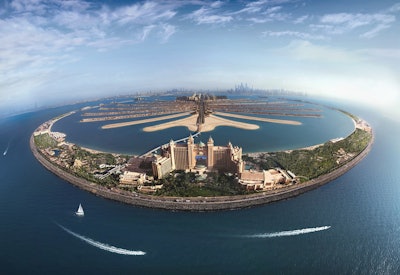
Want more content like this sent directly to your inbox? Then sign up for our brand-new BizBash Event Tech monthly newsletter to stay in the know on the latest event technology news and tools to elevate your meetings and events.
Through the metaverse, the meeting and event industry may be entering the realm of science fiction. The science, of course, is the advancement of technology—not necessarily new—toward eco- and budget-friendly ways of promoting attendance and audience engagement.
The fiction, at least for now, could be just how revolutionary the metaverse turns out to be in an industry primarily built upon physical interactions. “We’re not even in the first inning,” Ben Chodor, CEO of Notified, says of the Avatar-based ecosystem reliant on headsets.
The Atlanta Braves, the 2021 World Series champions, was the first pro team to announce that its stadium, Truist Park, and neighboring entertainment district, The Battery Atlanta, would be joining the metaverse—an ironic twist given Major League Baseball's 97-day lockout, which went into effect on Dec. 2, 2021. Atlanta’s announcement, made in late February, is one of several firsts being touted throughout the hospitality and events industries as the space race to the virtual world continues.  StarBase is a hybrid event space that blurs the line between virtual and reality.Photo: Courtesy of StarBase
StarBase is a hybrid event space that blurs the line between virtual and reality.Photo: Courtesy of StarBase
The aptly named StarBase, an 8,000-square-foot hybrid venue tucked less than a mile from Allegiant Stadium in Las Vegas, used CES 2022, the largest tech convention in the world, to showcase its spot as the initial business in MetaVegas, an artificial version of the city already known as a world unto itself. And luxury hotels, notably The Madrid Marriott Auditorium Hotel & Conference Centre in Spain and Atlantis, The Palm in Dubai, are getting in on the action through corporate tech companies such as RendezVerse.
Tech for the Times
So how well will event professionals need to be versed in this technology, which Fresh Wata executive director and CEO Tricia Costello, architect of the StarBase project (and others), describe as “web 3.0?”
Chodor, whose company specializes in digital and hybrid events, remains skeptical of many real-world applications being promised by metaverse pioneers—but he sees immediate benefits when the tools are used in short bursts. “You asked, ‘The natural comparison of the incoming metaverse might be to the Internet revolution. Do you think that's a fair comparison?’ My answer is ‘No.’ One changed the world and one might make it a little more interesting.”
Indeed, it seems that just as meeting and event professionals are becoming accustomed to digital integration of marketing programs, educational offerings and company gatherings, they will have to again be thrust into trial-and-error mode for using advanced technology.
It should be noted that the term “metaverse" is not new. Science fiction author Neal Stephenson is credited for coining the term in 1992—years before the Internet was widely accessible—when describing a world where humans and avatars interact in his book Snow Crash.
Even while virtual and augmented realities are being perfected among corporate entities and entertainment-based companies, avatars have already been in the pipeline. Andrew Wilson, executive vice president and chief marketing officer of the Atlanta Convention & Visitors Bureau (ACVB), is hardly alone in drawing comparisons to Second Life, an online virtual platform that dates back to 2003—one year before Facebook, the company that reinvigorated the meaning of the metaverse—was founded.
Mark Zuckerberg's rebranding of Facebook’s parent company to Meta last year changed the nomenclature and took the technology revolution mainstream. Now, it's seemingly impossible to have a conversation about the future of events without including the words “blockchain,” “NFT” and “metaverse.” And with so many parties vested in the digital space, innovation and adoption may come faster than expected.
Wilson predicts: “I think this technology will follow a similar path as that of Moore’s Law. The rate of change or progress will accelerate rapidly.” Fresh Wata’s Costello agrees. “It's going to be just like how we used to say the Internet was futuristic, back in the day.”
You don’t need to be a science fiction author to see that the world is going to recalibrate based on the desire to physically go places and do things again, while taking advantage of technology that substitutes for when travel isn’t an option. It may seem contradictory, but with that being said, convention and visitors bureaus—especially in hubs like Las Vegas and Atlanta, will dive deeper into the metaverse to convince would-be visitors and attendees to unplug in their destination and venues.
Here, we explore how CVBs can help enhance their branding and marketing efforts while bridging the gap between the physical and virtual worlds.  Luxury hotel Atlantis, The Palm in Dubai, is utilizing the metaverse through corporate tech company RendezVerse, which is leveraging these new technologies to shape the future of B2B and B2C events.Photo: Courtesy of RendezVerse
Luxury hotel Atlantis, The Palm in Dubai, is utilizing the metaverse through corporate tech company RendezVerse, which is leveraging these new technologies to shape the future of B2B and B2C events.Photo: Courtesy of RendezVerse
1. For site visits
Still photography seemingly stood the test of time, effectively showcasing event venues and spaces in pamphlets and on websites. The next generation for remote tours brought about video footage. At the rate of metaverse expansion, while still images and video won't become obsolete, they will likely be integrated into what technology the future really holds.
RendezVerse is built around the concept that meetings and event organizers may not have the time and resources to travel on-site during the site selection and planning processes. “In the most simple terms, RendezVerse creates 3D models of real environments in which people, using VR headsets, can meet as avatars to walk, talk and explore the endless possibilities that can then be brought to life in the real world,” a company press release states.
Hilton, Four Seasons and Marriott are development partners for the technology, and it’s easy to see why. Virtual site visits cut down on travel costs and emissions, plus save time and provide the best experience to date. But "the mouse doesn’t do a venue justice,” Chodor notes, adding, "the metaverse allows me to feel the size and scope of a location.”
CVBs should find savvy tech partners like Fresh Wata, which see the metaverse as a tool to bring people together physically rather than trap them in a headset. “We want tons of people coming to our city,” says Costello. “We have a new wing of our convention center. Let’s show it off!”
2. To look futuristic
Speaking of showing off, there is certainly an element of demonstrating forward-thinking in becoming an early adopter of any technology. Wilson says the Atlanta CVB continually strives to demonstrate it is ahead of the game. “In 2019, we took Oculus headsets to South by Southwest and ASAE’s annual meeting to allow attendees to get a virtual experience of areas around Atlanta. While it did not use a virtual world platform, it was successful in demonstrating how ACVB is forward-thinking when it comes to technology,” notes Wilson.
Costello adds that the timing is right now, with headset prices coming down and some versions of the technology allowing for the experience without wearing a device.
3. To grow audiences In the metaverse, a digital version of Truist Park will "create a new way for our fans to connect with our team and their favorite ballpark," said Derek Schiller, Atlanta Braves' president and CEO.Photo: Courtesy of Atlanta Braves
In the metaverse, a digital version of Truist Park will "create a new way for our fans to connect with our team and their favorite ballpark," said Derek Schiller, Atlanta Braves' president and CEO.Photo: Courtesy of Atlanta Braves
“It’s exciting to create a new way for our fans to connect with our team and their favorite ballpark,” says Derek Schiller, Atlanta Braves president and CEO. “The digital version of Truist Park will offer limitless opportunities to create unique fan engagements in the metaverse.”
The Braves’ vision includes the ability to:
- Create and customize avatars
- Explore exclusive areas of Truist Park and The Battery Atlanta, including the Braves Clubhouse, Monument Garden, etc
- Enjoy exclusive content, performances and meet-and-greets
- Meet and interact with other Braves fans from around the world
- Experience Braves’ history through interactive features
- Celebrate the Braves 2021 World Series win
- Play games, find ‘Easter eggs,’ win prizes and more
The same principles can be easily adapted for a conference or convention inside a city. When done properly, a metaverse production will feel like an experience outside a home or office versus simply attending a series of webinars.  Schiller said he hopes to take advantage of the metaverse to give people from around the world the chance to (virtually) explore exclusive areas of Truist Park and The Battery Atlanta, including the Braves Clubhouse and Monument Garden.Photo: Courtesy of Atlanta Braves
Schiller said he hopes to take advantage of the metaverse to give people from around the world the chance to (virtually) explore exclusive areas of Truist Park and The Battery Atlanta, including the Braves Clubhouse and Monument Garden.Photo: Courtesy of Atlanta Braves
4. To host small events
Citywide, expos, concerts and sports are going to always prefer the in-person option—but that doesn’t mean virtual events are going anywhere. Wilson envisions networking or education-based programs for 200 attendees or less being conducted in the metaverse.
Meanwhile, Chodor doesn’t see attendees wearing an Oculus for three days in a row (yet), but says 3D technology is ideal for teaching a new skill or gaining further understanding of a subject. “Being able to see a car’s engine and know what it's like to sit in the car is super compelling,” he says.
Destinations known for medical meetings, for example, could highlight the technology when bidding on future conferences because that type of interactive demonstration would be difficult to replicate in-person with hundreds in attendance.
5. For good old-fashioned marketing
What better way to demonstrate what someone is missing out on than showing it to them? The idea is all the better when the virtual experience is, thus a greater chance potential attendees or visitors will crave the real McCoy.
“It's a really cool experience,” Costello says. “You can travel around to waterslide or the Welcome to Las Vegas sign.” On those walks or at the event venue, CVBs can install signage like a poster or billboard.
Wilson also sees the metaverse as an expansion of his team’s goals. “We seek to change perceptions, make you crave what you did not before and drive your intent to purchase,” he says. “We will continue to define our brand as we do in the real world and in the virtual, by curating and shaping those experiences that we believe best represent the destination.”
